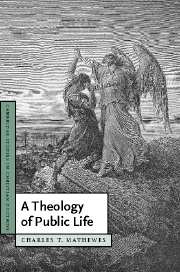Book contents
- Frontmatter
- Contents
- Acknowledgments
- List of abbreviations for works by St. Augustine
- Introduction: Life in the epilogue, during the world
- Part I A theology of engagement
- Part II The liturgy of citizenship
- Conclusion: The republic of grace; or, the public ramifications of heaven
- List of references
- Index
Introduction: Life in the epilogue, during the world
Published online by Cambridge University Press: 05 June 2012
- Frontmatter
- Contents
- Acknowledgments
- List of abbreviations for works by St. Augustine
- Introduction: Life in the epilogue, during the world
- Part I A theology of engagement
- Part II The liturgy of citizenship
- Conclusion: The republic of grace; or, the public ramifications of heaven
- List of references
- Index
Summary
A mirror for Christian citizens
What has Washington to do with Jerusalem? This book aims to answer this question. It provides Christian believers with one way to understand why and how they should participate in public life. It does so by offering a broadly Augustinian “theology of public life,” a picture of Christian life as it should be lived in public engagement.
The title foreshadows the argument. The book studies “public life,” not simply “politics.” “Public life” includes everything concerned with the “public good” – everything from patently political actions such as voting, campaigning for a candidate, or running for office, to less directly political activities such as serving on a school board or planning commission, volunteering in a soup kitchen, and speaking in a civic forum, and to arguably non-political behaviors, such as simply talking to one's family, friends, co-workers, or strangers about public matters of common concern. Furthermore, this study is undertaken as a “theology of public life,” not a “public theology.” Typically, “public theologies” are self-destructively accommodationist: they let the “larger” secular world's self-understanding set the terms, and then ask how religious faith contributes to the purposes of public life, so understood. In contrast, a theology of public life defines “the public” theologically, exploring its place in the created and fallen order and in the economy of salvation.
- Type
- Chapter
- Information
- A Theology of Public Life , pp. 1 - 28Publisher: Cambridge University PressPrint publication year: 2007



